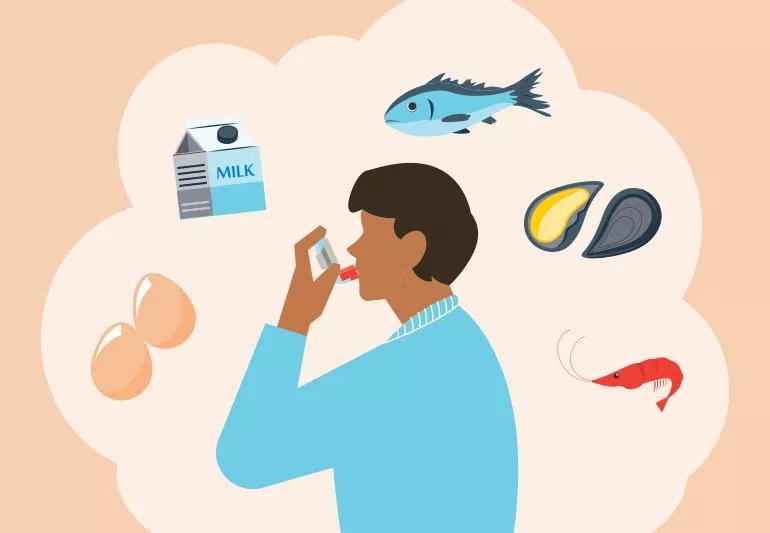Some foods might aggravate the condition

Image content: This image is available to view online.
View image online (https://assets.clevelandclinic.org/transform/0854ab3c-8792-4041-862a-2168af3af310/allergyFoods-1314630300_770x533-1_jpg)
Illustration of person with inhaler surrounded by foods that may cause asthma
Have you ever eaten something and then broken out in hives? Or ended up with a rash or worse — nausea, vomiting or diarrhea? Reactions like these to foods are considered adverse reactions that can stem from food intolerances or allergies. Allergy and clinical immunology specialist Ahila Subramanian, MD, MPH, helps us understand these reactions and reveals if they can affect asthma.
Advertisement
Cleveland Clinic is a non-profit academic medical center. Advertising on our site helps support our mission. We do not endorse non-Cleveland Clinic products or services. Policy
Any reaction to a food that’s abnormal is considered an adverse reaction. Adverse reactions are classified either as a food intolerance or a food allergy. “These two terms are often mistakenly used interchangeably, but it is important to know the difference as the approach to diagnosis and treatment differs greatly,” says Dr. Subramanian.
A food allergy is defined as an overreaction by your body’s immune system to proteins in foods that are usually safe or harmless. The overreaction is caused by Immunoglobulin E (IgE), antibodies that can cause allergic reactions in your nose, throat, lungs, skin or circulatory system.
Food intolerance is an abnormal response to an ingested food that’s not an allergy. Food poisoning, difficulty digesting specific foods and reactions to chemicals in food or drinks like caffeine are some examples of food intolerance.
Food is not a normal asthma trigger. On the other hand, if you have a food allergy, asthma can make allergic reactions worse. The most common symptoms of food allergies are hives, rash, nausea, vomiting and diarrhea.
The most common foods associated with allergic symptoms are:
Advertisement
When eaten in large amounts, some food additives — like sodium bisulfite, potassium bisulfite, sodium metabisulfite, potassium metabisulfite and sodium sulfite — can irritate asthma. These additives tend to be preservatives and can be found in the following foods:
If you feel like certain foods could be making your asthma worse, talk to your healthcare provider. They can perform tests to determine if you’re allergic.
“It is important to note that skin testing and most blood tests are not useful in the diagnosis of food intolerance,” Dr. Subramanian cautions. “A doctor who specializes in allergies and immunology can determine if a reaction is consistent with a food allergy or food intolerance by reviewing your medical history. Based on this, they can advise the appropriate next steps.”
If a food trigger is identified, avoiding the food is the best way to prevent asthma reactions. It’s also important to read food labels — and when dining out, make sure the dish you’re interested in isn’t made with ingredients that you’re allergic to.
Advertisement

Sign up for our Health Essentials emails for expert guidance on nutrition, fitness, sleep, skin care and more.
Learn more about our editorial process.
Advertisement
Wearing a scarf, adjusting your outdoor activities and following your asthma treatment plan can help limit breathing problems
Adult-onset asthma has the same symptoms as childhood asthma, but tends to be more severe
An asthma action plan is a personalized, step-by-step set of instructions for handling asthma attacks
Checking the weather, pollen counts and air quality can help you avoid asthma triggers
Stress can trigger and worsen asthma symptoms, like coughing and shortness of breath
Smoking, including secondhand smoke, can worsen your asthma triggers and damage your airways
Nighttime asthma attacks can be due to acid reflux, allergens and hormonal changes, but treatment can help prevent them
The effectiveness and safety of many of these options are unknown, so it’s best to stick to traditional care
Prioritize your health by managing stress, strengthening your social connections and getting quality sleep
Bolsters, blankets, pillows and blocks can offer extra support, stability and comfort
Allergies, postnasal drip, asthma or reflux could be to blame for a cough that won’t quit